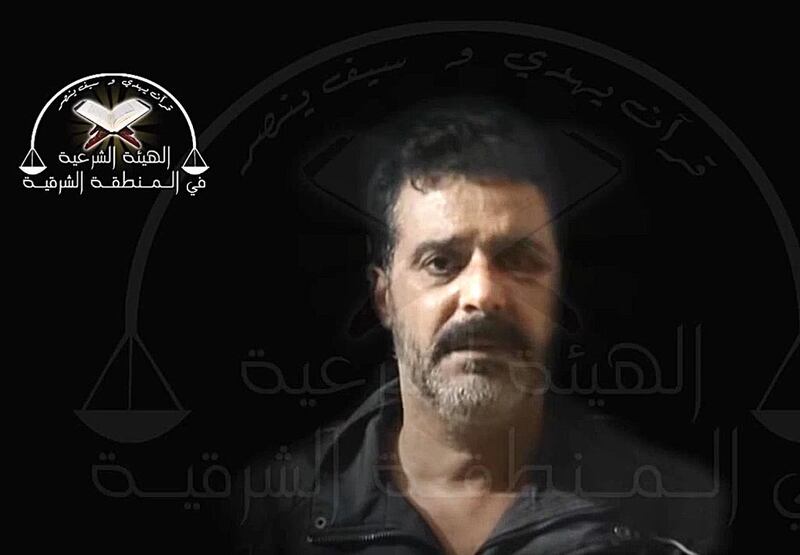Foreign correspondents
AMMAN // Western-backed militants fighting on Syria's southern front have met secretly with Jabhat Al Nusra, in a renewed effort to free a key rebel leader the group abducted last month.
The latest talks, between five Free Syrian Army commanders and five leading members of Al Nusra, the Al Qaeda affiliate in Syria, took place at the end of last month in a guesthouse in Al Jizza, in eastern Deraa. The area is an Al Nusra stronghold.
A source familiar with the meeting said all of the leading Al Nusra members, or emirs, present at the negotiations were Jordanians, underscoring the role of foreign militants in the group’s leadership structure. Its rank and file fighters are overwhelmingly Syrian.
Among those taking part were Sami Al Uraydi, known as Abu Mahmoud Al Shami, a Jordanian of Palestinian origin, considered a religious authority within Al Nusra.
Abu Julaibeeb, a Nusra emir who is married to the sister of Abu Musab Al Zarqawi, was also present.
Al Zarqawi, a Jordanian born leader of Al Qaeda in Iraq, was killed by US forces in 2006. He played a major role in the insurgency in western Iraq, where militants from his Al Qaeda group have recently re-emerged, pushing out government forces.
Other Nusra emirs involved in the talks include Abu Al Bara’a and Abu Seif.
According to the account of the meeting — which was held without the knowledge of other FSA units and remains a closely guarded secret — the Al Nusra commanders again refused to release Col Ahmed Nehmeh, an FSA officer they ambushed and captured in the early hours of May 4.
“Everyone agreed that Nehmeh should be arrested and we cannot release him until this issue has been properly dealt with,” Mr Al Uraydi told the secret meeting, according to the source.
Col Nehmeh was a prominent FSA figure, with close connections with Jordan’s General Intelligence Directorate (GID). Col Nehmeh was also close to the Military Operations Command (MOC) centre, or operations room, run out of GID headquarters in Amman, which is staffed by western and Arab military officers and aims to support moderate rebels.
Those links, and suggestions he was in the process of putting together an anti-Al Nusra alliance in the south, to counter Al Qaeda’s rising influence there, appear to have prompted his detention — a highly symbolic slap-in-the-face to Western and Arab backed rebel factions.
Jordan’s GID, in alliance with Western intelligence, has struggled to contain Islamic radicalism in the kingdom, which burst into the open with the rise of Al Zarqawi as Al Qaeda’s leader in Iraq. He took his nom de guerre from Zarqa, the Jordanian city of his birth.
The war in Syria has given militants a new outlet just across the border, and with it the possibility of controlling territory beyond the reach of foreign intelligence agencies.
“Al Nusra wants to twist Jordan’s arm, this is a message from [Nusra’s] Jordanian emirs to Jordan’s security services,” said a former military officer in Amman, on condition of anonymity.
Al Nusra has rebuffed earlier efforts — and brushed aside threats of military action — by the FSA to have Col Nehmeh freed, insisting he stand trial for treason and conspiring against the rebellion to overthrow president Bashar Al Assad.
There was also no concrete progress towards getting FSA commanders represented on a panel of judges that will hear Col Nehmeh’s case.
Previously, Al Nusra has insisted it, and other radical Islamic fighting groups, would conduct the trial.
Rebel commanders with connection to Al Nusra say there are at least 33 Jordanian emirs, mostly from Palestinian origin, among the group’s senior ranks in southern Syria, many of whom fought as part of Al Qaeda in Iraq and Afghanistan. As many as 800 Jordanian fighters are among Nusra’s rank and file across Syria, according to some estimates by rebel commanders. Most of the fighters are believed to be Syrians however.
During the May 31 meeting, Al Nusra’s Mr Al Uraydi also questioned the FSA officers present on their long-term goals for the rebellion. All except one FSA officer said they hoped to see an Islamic state formed in Syria respectful of the rights of minority groups.
A lone FSA commander told Mr Al Uraydi he wanted to see a civil, democratic state. Mr Al Uraydi’s response was a polite rejection of that vision, the source familiar with the meeting said.
Southern Syria has long been the most coherent and well-controlled rebel front, in contrast to the chaos and infighting among rebel factions in northern and eastern Syria, where Al Qaeda affiliated groups have fought more moderate groups.
Al Nusra was considered a minor player on the southern front, where rebels have been given limited backing, including military training, by the US and Arab Gulf states. But, with the abduction of Col Nehmeh, Al Nusra’s ascendancy has been underscored, fuelled by its ability to pay fighters a regular salary and its reputation as the most disciplined and effective fighting force.
psands@thenational.ae
Suha Ma’ayheh reported from Amman, Phil Sands contributed from Boston.





